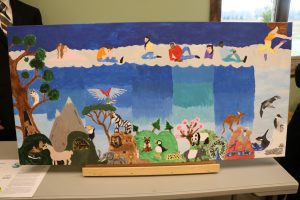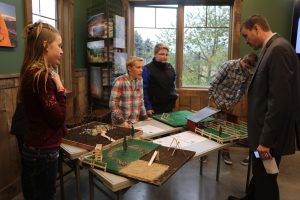Living Sustainably: 10 Ways to Live a More Nature-Rich Life
By Jane Naber and Hamilton STREAM school students
Being nature rich is more than going green; it’s about going outside regularly and finding value in doing any activity in nature. It means letting a connection to nature enrich you, your family, and your community. Consider these ways to live a more nature-rich life, with references to learn more.
- Take a walk outside.
Why? Walking outside can help you lose weight, keep you healthy, and reduce stress (Better Policies for a Healthier America, September, 2016).
- Encourage the creation of green spaces for learning and exploration.
Why? Cathy James states, “Anything you can teach in an indoor classroom can be taught outdoors, often in ways that are more enjoyable to children” (James, Cathy, The Garden Classroom, 2015). Recent studies show that children thrive when given the opportunity to learn outside (The Pathfinder School.org) 
- Get your employees outside!
WHY? Lisa Evans of Entrepreneur in “Why You Should Take Your Work Outside” states, “Trapping ourselves indoors has created what health experts call a ‘nature deficit disorder’. Depression or anxiety result from too little time spent outside.”
- Know your resources
Why? The Outdoor Discovery Center provides many classes for learning outside such as “Up Close and Wild,” “Wondrous World of Water,” and “Live Birds of Prey.” outdoordiscovery.org
- Take your family to the park
WHY? New research suggests that families who regularly get outside together tend to function better. (Rick Nauert in “Outdoor Functions Can Improve Family Bonding,” 2016).
https://psychcentral.com/news/2016/06/21/outdoor-functions-can-improve-family-bonding/105089.html
- Be energy efficient –use renewable resources
WHY? The use of fossil fuel is unsustainable. At the current rate, oil will run out in 53 years, natural gas in 54, and coal in 110. (Siddharth Singh, “How Long Will Fossil Fuels Last?” 2015)
- Plant a tree
Why? Trees improve the community by keeping it cool (it can be 31 degrees cooler in the shade) and absorbing pollutants. This can aid in lowering air conditioning costs. (ProjectEvergreen.org)
- Explore the woods safely
Why? There are some things out there that can hurt you or ruin your day…but if you are properly prepared you will be ready for any adverse weather, critters, or other challenges that you may encounter.” (rogerfulton.com)
- Plant a Garden
Why? You will save about two pounds of carbon from entering the atmosphere for each pound of produce you grow for your family. (Green and Healthy Homes.org)
- Value Nature
Why? “To sit in solitude, to think in solitude with only the music of the stream and the cedar, to break the flow of silence, there lies the value of wilderness.” – John Muir
 STREAM School is a cross-curricular program at Hamilton Community Schools where students also learn everyday skills while connecting their learning to the outdoors. Recently, 120 middle schoolers presented “Art and Animals” at the Outdoor Discovery Center where 20 ideas were shared through art to encourage Holland residents to be nature-rich.
STREAM School is a cross-curricular program at Hamilton Community Schools where students also learn everyday skills while connecting their learning to the outdoors. Recently, 120 middle schoolers presented “Art and Animals” at the Outdoor Discovery Center where 20 ideas were shared through art to encourage Holland residents to be nature-rich.
PHOTOS:
CUTLINE for Nature rich1.jpg, Naturerich2.jpg: Some 120 middle schoolers recently presented “Art and Animals” at the Outdoor Discovery Center where 20 ideas were shared through art to encourage Holland residents to be nature-rich.
ABOUT THIS SERIES
Living Sustainably is a collection of community voices sharing updates about local sustainability initiatives. It is presented by the Holland-Hope College Sustainability Institute, a joint project of Hope College, the City of Holland, and Holland Board of Public Works. Go to www.hope.edu/sustainability-institute for more information.
This Week’s Sustainability Framework Theme
![]() Environmental Awareness/Action: Environmental education and integrating environmental practices into our planning will change negative outcomes of the past and improve our future.
Environmental Awareness/Action: Environmental education and integrating environmental practices into our planning will change negative outcomes of the past and improve our future.


